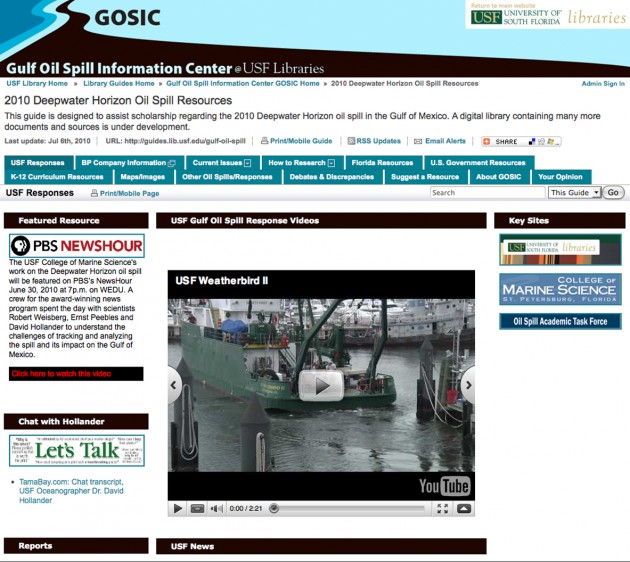Library database collects oil spill information

Although efforts to remove oil from the Gulf of Mexico following the Deepwater Horizon oil rig explosion have proved to be a monumental chore, the USF Tampa Library has embarked on its own clean-up operation.
The Gulf Oil Spill Information Center (GOSIC) is an online virtual database that allows users to freely sort through the myriad of information on the spill, ranging from published literatures to blogs and news articles, which will be “looked at for decades,” said Todd Chavez, director of Academic Resources.
“The published literature is most important for scientific research,” he said. “The rest of the information on the website will be important for human understanding.”
The website, which can be accessed at guides.lib.usf.edu/gulf-oil-spill, has given the Library the opportunity to ask other institutions and universities to collaborate with it to bring “more information to the portal,” Chavez said.
“We’re also asking for volunteers from the USF community,” he said. “If there’s anything that students and faculty would like to see, we’d like to hear from them.”
The wealth of information surrounding the April 20 explosion and the millions of gallons of oil that have been swept into the waves of the Gulf is “hard to filter and categorize,” said Vera Lux, who is an instructor librarian in the department of Academic Services that helped create the website in only three days. That is partly because many sources cover the same topics.
“We’re basically trying to put up the most unique and useable information right now,” she said. “The database is updated multiple times a day … we’ve added two or three pages just this week.”
The Library is currently using an offline database to contain information that cannot be stored on the website.
“We can’t put everything online because it would just be too much information and also because of copyright laws,” she said. “Once we get permission to use those copyrights, we can add the information to the database.”
Chavez said that another advantage of the database is that it provides a level of security for the information — something he said could disappear because of “political implications.”
“In the past, resources have disappeared when there was a political problem associated with them,” Chavez said. “Information today is very fluid … a website can come up today, and it can later disappear.”
Lux said the GOSIC database will continue to grow as librarians incorporate archives of the University’s involvement with the spill, garnering attention from outside the state.
“We’ve been contacted by the National Library of Medicine, and they’re pleased with the guide,” she said. “It has a lot of potential for scholarship.”






